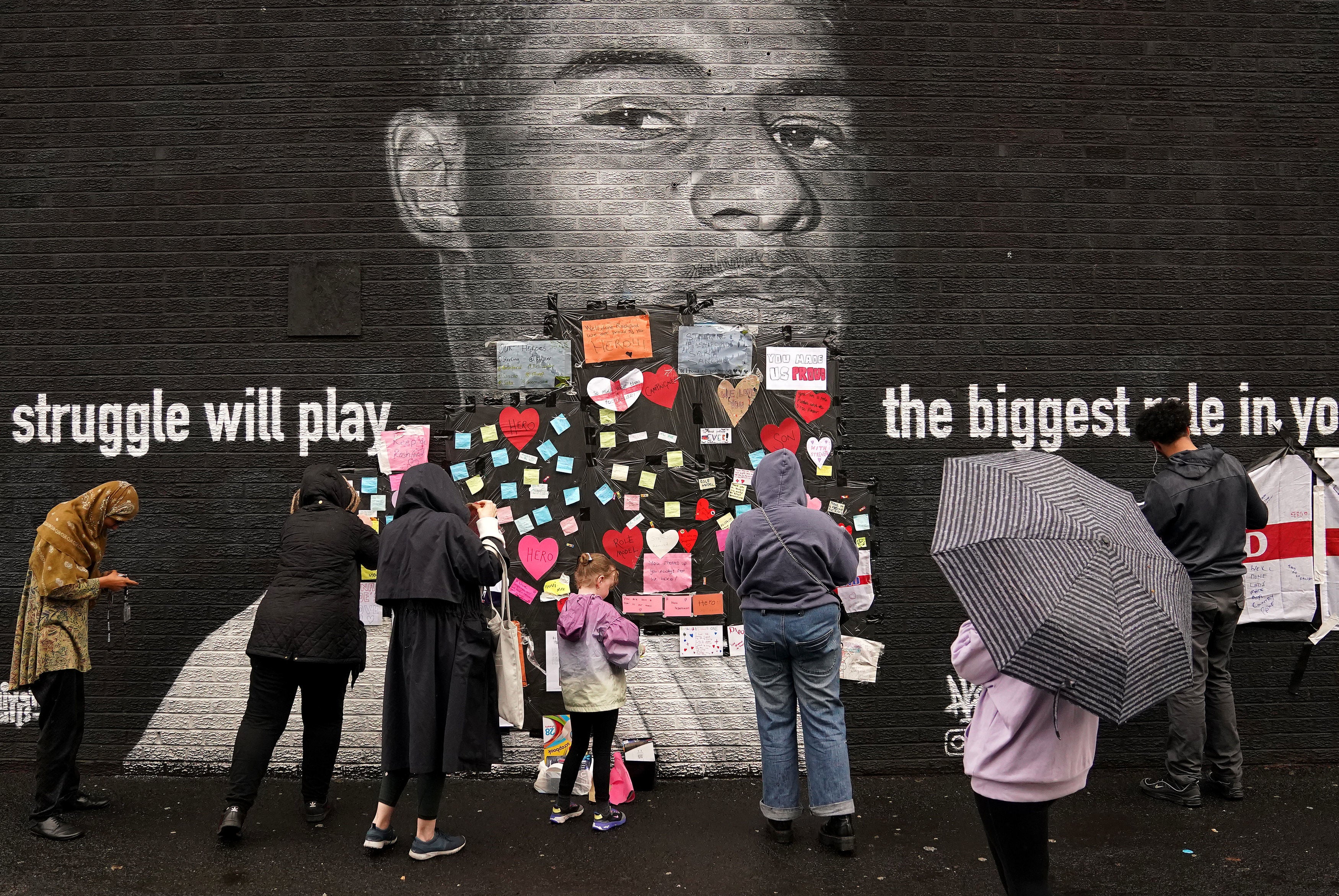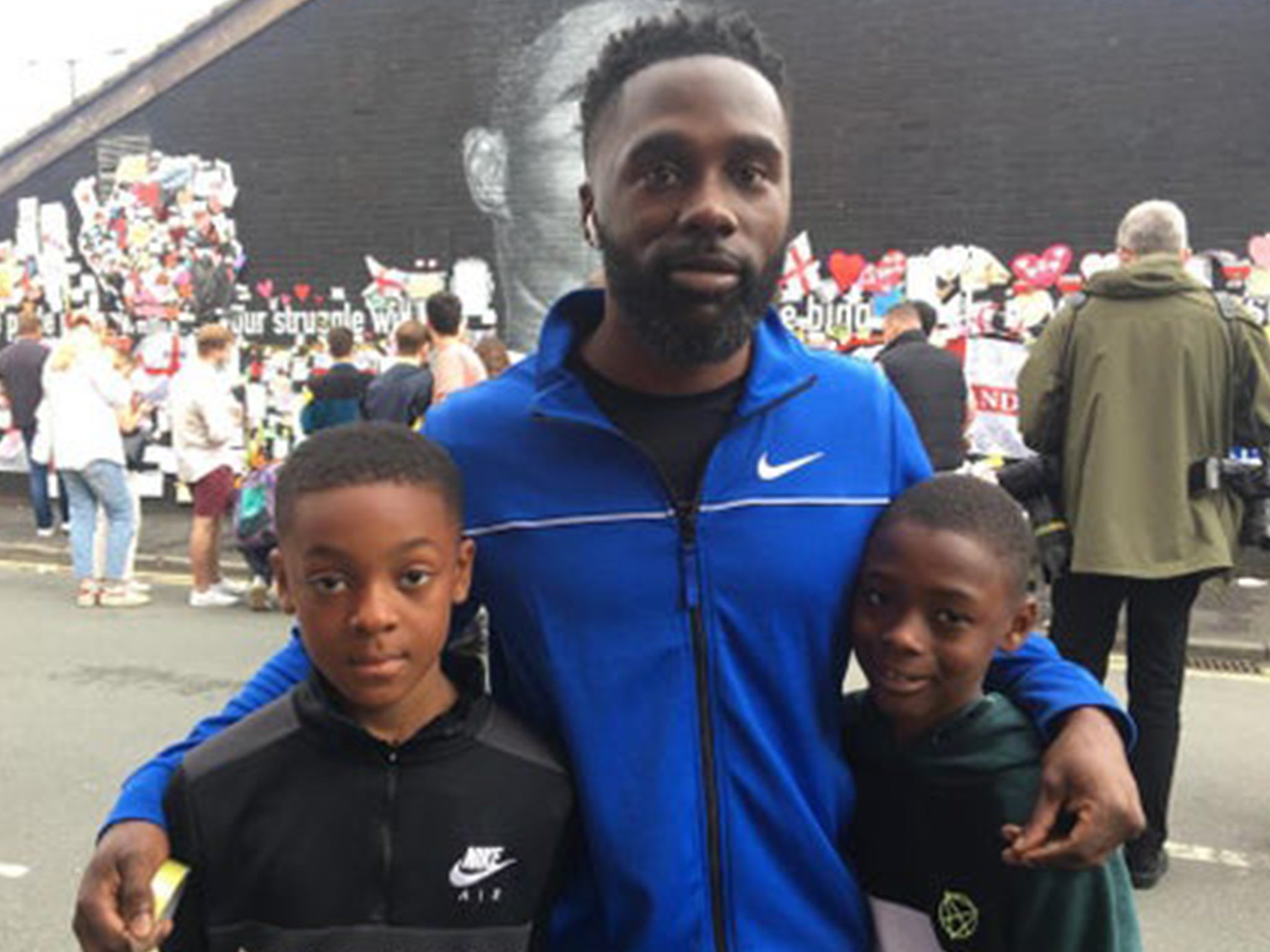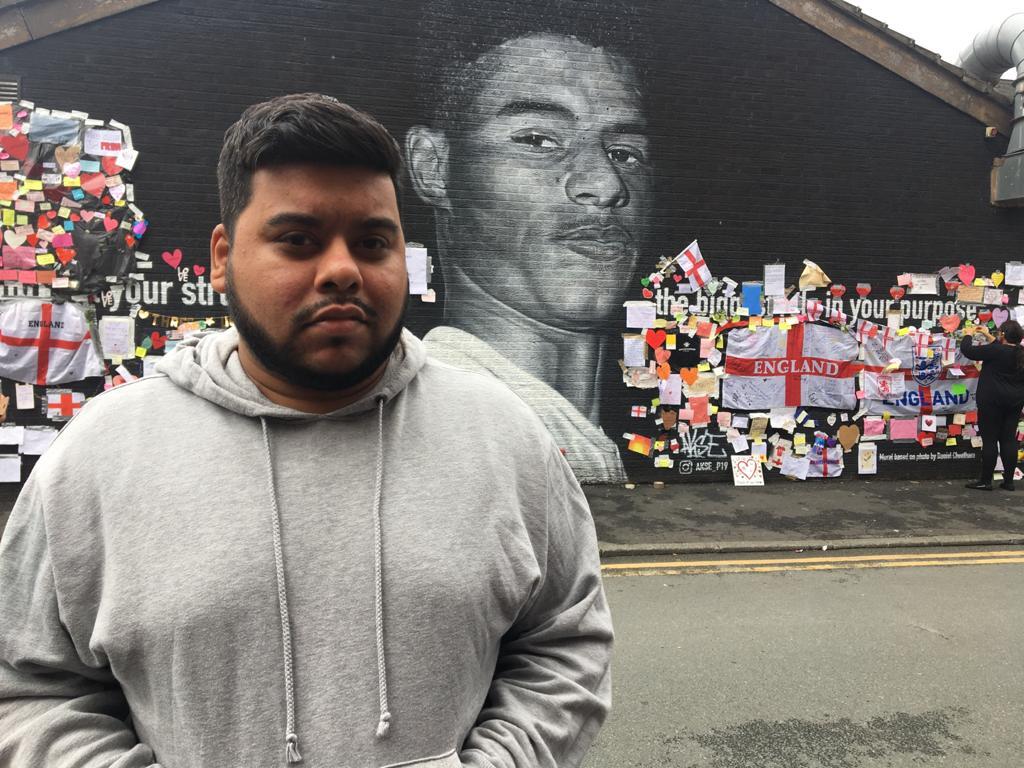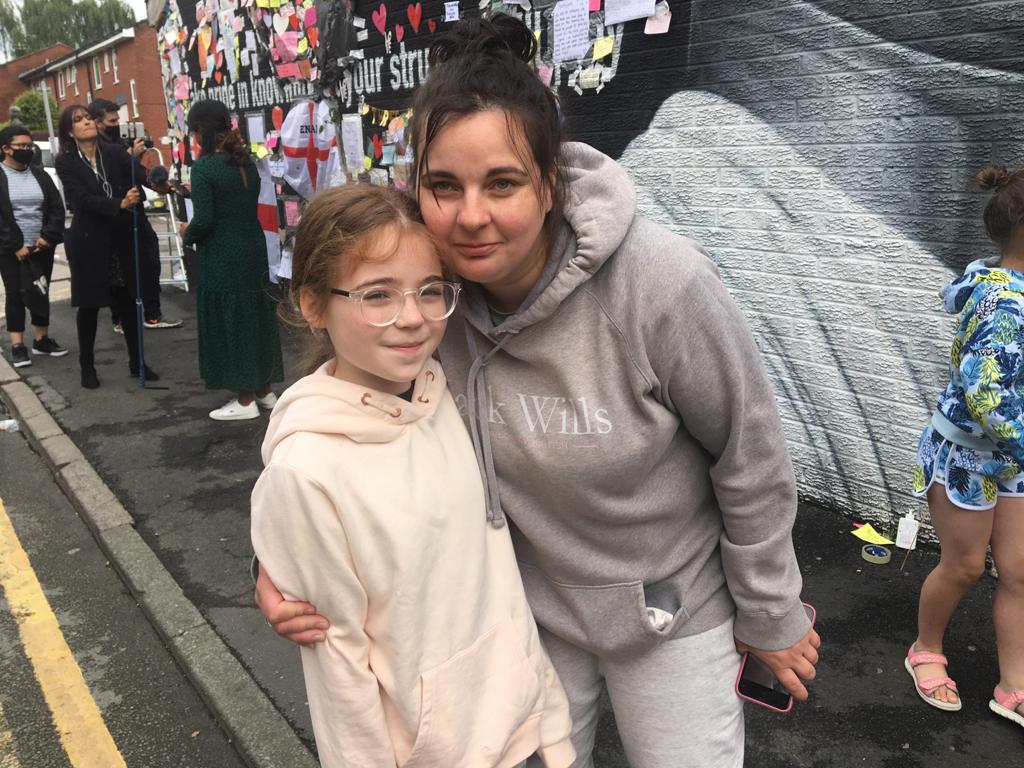‘A show of support’: Hundreds descend on defaced Marcus Rashford mural to decry racist graffiti
Rashford is much loved in Manchester, partly because of his footballing ability, but also because of what he has done off the pitch, writes Colin Drury


Your support helps us to tell the story
From reproductive rights to climate change to Big Tech, The Independent is on the ground when the story is developing. Whether it's investigating the financials of Elon Musk's pro-Trump PAC or producing our latest documentary, 'The A Word', which shines a light on the American women fighting for reproductive rights, we know how important it is to parse out the facts from the messaging.
At such a critical moment in US history, we need reporters on the ground. Your donation allows us to keep sending journalists to speak to both sides of the story.
The Independent is trusted by Americans across the entire political spectrum. And unlike many other quality news outlets, we choose not to lock Americans out of our reporting and analysis with paywalls. We believe quality journalism should be available to everyone, paid for by those who can afford it.
Your support makes all the difference.Tru Powell’s two sons, David and Israel, should have been at school Tuesday morning but, shortly before the pair woke up, he decided they would be having half a day off.
Instead, he drove the pair, aged 10 and eight, the hour and a half from the family home in Birmingham to visit the Marcus Rashford mural in Manchester.
“I said, ‘Right boys, I’m clearing my diary, I’m calling school and we are going to go and show our solidarity’,” the 36-year-old entrepreneur tells The Independent. “They have both experienced racism and I think it’s really important for them to see that even after that kind of treatment, they can still come out on top. I felt the education they’d have from coming here was equal to anything they would learn at school today.”
On an overcast morning, the trio were among hundreds of people making a pilgrimage to this now famous piece of street art in Manchester’s Withington neighbourhood where Rashford spent his early childhood.
They came, the crowds, to show support after the mural was vandalised following the 23-year-old’s penalty miss in the Euro 2020 final. They came with love hearts, letters, messages on post-it notes, flowers, England flags and the defiant attitude that racism would not be tolerated here. By Tuesday afternoon, the wall here was so covered with symbols of admiration and affection, it resembled a shrine of sorts; not just to a local boy in an hour of need but to an idea perhaps. This – love not hate; inclusion not division – was Withington. This was Manchester.
“It’s heart-warming to see so many people here, so many allies,” said Powell. “And I know [the abuse] is only some people but it only takes some people to make you feel like dirt and spark trauma so… yeah, seeing this, it makes you realise you’re not in this alone.”

The story so far, you’ll probably know.
Just hours after Rashford missed that penalty on Sunday, this mural – first created last October – had been sprayed with graffiti described by Greater Manchester Police as “racially aggravated”. It savaged not just Rashford but fellow internationals Jadon Sancho and Bukayo Saka who had also missed spot-kicks. It felt, many have said, almost inevitable. “If a white player misses a penalty, says Powell, “[people say] theyre having a bad game. If a black player misses one, [they say] they don’t belong in this country.”
Then Monday morning came.
At some point early on, reports started appearing on social media that a lone woman had taken a bunch of hearts to the mural and was sticking them over the graffiti. She had laminated post-its with a message of support to Rashford. Inspired by her actions, others arrived, doing the same. By Tuesday, there were so many coming that Manchester City Council closed off the road. Someone brought a loud-speaker and started blasting out M People. Hand gel was put out. The vibe by midday was street party. Later, a taking-the-knee protest is planned.
“My interpretation is that this has been a cathartic experience for people here, that it’s been a way to express empathy and to show the minority that they are just that, a minority,” says Ed Wellard who, as a founding volunteer with the Withington Walls street art project, helped commission the work in the first place. “We are a really diverse community and that community wanted to say this graffiti isn’t who we are.”
That Rashford himself is hugely loved here – both post- and pre-penalty – there is no doubt.
Partially that’s because of his footballing ability, of course: he scored more than 20 goals for Man Utd last season. But it’s also because of what he has done off the pitch. Which is to say, in an area where there are significant levels of deprivation, his campaigning on food poverty – most notably forcing the government into a U-turn on providing free school meals last year – has seen his star transcend sport. People love Rashford because, in him, they see a young man on their side.
“He’s just a decent guy, isn’t he?” says Wellard, himself a 43-year-old civil engineer. “He’s humble, honest, pragmatic. He’s kept himself non-partisan, not aligned himself with or against any politicians; he’s just stuck to trying to resolve the issues he cares about. The [England] entire team, they are a fine set of young men. They are giving their match day bonuses to NHS charities. You can’t argue with that.”
Inside the cafe which the mural is painted on – Coffee House Cafe, all day breakfasts £3.70 – owner Pete Doherty agrees with Wellard, although puts it slightly differently.
“When I was a young, our footballing role models were Gazza getting smashed every night or Wayne Rooney getting himself into sex scandals with women old enough to be his nana,” he says, between serving bacon butties. “Compared to that, you have Marcus feeding kids. He’s a hero, isn’t he?”
But he himself, Doherty, is a Man City fan. Should he really have a United player monstering his outside wall?
“Football is football,” he says. “Whatever your tribe, Rashford is Manchester. He’s got class.”
For Younus Alam, this is precisely the point.
The 29-year-old online apprentice teacher lives just five minutes from the mural and went to school with Rashford’s older brother Dane. So, when he saw people paying tribute at the mural, he felt it important to add his voice.

“For the past year, he [Rashford] has been helping people in this community, as well as across the country, with food banks and stuff like that,” he says. “And I think now is our time to support him. He’s a Withington lad, born and bred Manc like me; and I wanted to… tell him I’m proud of him. Everyone here is. The people who did this [the graffiti] they don’t speak for anyone.”
Alam stuck up a quote from basketball legend Kobe Bryant that he felt summed up Rashford: “The most important thing is to try and inspire people so they can be great in everything they do,” it reads.
“He’s got his whole career ahead of him,” says Alam. “The world is his oyster. But whatever he does now, he’s already achieved so much. I think this [mural] will always now be remembered for this moment.”
That could well be true. There are already talks that the sheer volume of tributes could be saved and displayed at the National Football Museum, also in Manchester. Rashford himself has indicated how important they have been to him over the last 24 hours. “The communities that always wrapped their arms around me continue to hold me up,” he wrote in a statement on Monday evening.
A permanent display would be fitting, reckons Linsey Eyre. The 37-year-old had brought 10-year-old daughter Martha from their home in Didsbury to stick up a message on Tuesday morning. “I just wanted to tell him to stay strong,” the youngster said. “Not to let the negativity get to him because there are so many people who love him.”

Which brings us back to Powell and his two boys. As they prepared to make the journey back to Birmingham, they had no regrets about coming. The show of support had been moving. But he was cautious about what it might mean.
“I hope it’s not performative, that it’s not here today gone tomorrow and no action is taken,” he said. “What do I mean by action? I mean allies maybe talking to their racist grandparents who have abhorrent views that don’t belong to society or, in the workplace, calling out there’s no senior leadership members who are black; or are they calling out racism in schools or the health system? It doesn’t just stop at visiting a mural. You have to want to make change.”
Join our commenting forum
Join thought-provoking conversations, follow other Independent readers and see their replies
0Comments